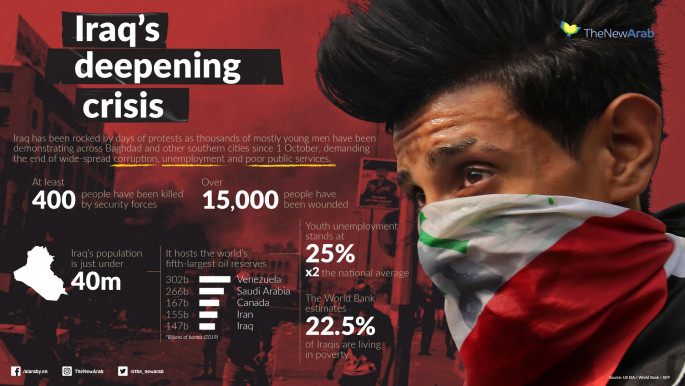Hundreds mourn Iraqi reporters shot dead 'for covering anti-Iran protests'
Ahmad Abdessamad, a 37-year-old correspondent for local television station Al-Dijla, and his cameraman Safaa Ghali, 26, were killed late on Friday, the Journalistic Freedoms Observatory (JFO) said.
Hundreds marched through the streets of Basra carrying symbolic coffins, their pictures and Iraqi flags.
"What happened was an attempt to scare people. But now, everyone in Basra has come out to mourn Ahmad and his colleague Safaa. It was clearly an attempt to silence people," one mourner told AFP.
The two reporters were in a car near a police station in Basra when armed men in a 4x4 approached them and opened fire.
"Armed men attacked them and sprayed them with bullets on Friday night, which killed Abdessamad. His cameraman was taken to the city hospital, where he died," the JFO said in a statement.
It said that two weeks before he died, Abdessamad had sent the JFO video testimony about "threats he received from militias because of his criticism of Iran in his coverage."
Demonstrations erupted in October in Iraq's capital and across its Shia-majority south, rallying against government graft and a lack of jobs.
The protests have also slammed neighbouring Iran for economic and political overreach in Iraq and for propping up a ruling class reviled by demonstrators.
Read more: US and Iran should stop holding Iraq's political sovereignty hostage
As the protests drag on, activists have complained of a growing campaign of intimidation, including assassinations, kidnappings and threats, meant to keep them from the rallies.
Around a dozen activists have been shot dead and are among the more than 460 people killed in protest-related violence since October.
The Iraqi Journalists' Union demanded Basra's police conclude a speedy investigation so that "the criminals be brought to justice".
The Committee to Protect Journalists, meanwhile, condemned the killing and urged Iraqi authorities to do more to protect reporters covering the movement.
 |
"No journalist should have to fear for their safety or be singled out for attack over their coverage of protests," said the CPJ's regional representative Ignacio Miguel Delgado.
Iraq's October protests began to slip out of the spotlight in late December after a US contractor was killed in a rocket attack on a northern Iraqi military base where American and other international troops are stationed.
The US blamed a hardline group in the Hashd al-Shaabi, a military network incorporated into the Iraqi state, and launched an air strike that killed 25 Hashd fighters.
Supporters of the group then besieged the US embassy in Baghdad and days later, the US launched a strike in Baghdad which killed Iranian Major General Qasem Soleimani and Iraqi paramilitary leader Abu Mahdi al-Muhandis.
Trump administration officials have justified the killings as an act of self-defence, saying Soleimani was planning military acts that threatened large numbers of American military and diplomatic officials in the Middle East.
Iran, however, called the attack an act of terrorism, and on 8 January it launched more than a dozen ballistic missiles at two bases in Iraq that house American and coalition forces. No one was killed in that retaliation.
Fearing their movement would be eclipsed by war, Iraqi activists posted calls on social media in recent days for a mass protest on Friday, which marked the inverse date, 10/1, of the first rallies on 1 October, or 1/10.
Iraqis turned out across the country, with hundreds streaming into the capital's Tahrir Square, the epicentre of the anti-regime movement, AFP journalists said.
"Screw Iran! Screw America!" they cried out in the iconic square, still lined with tents and stalls set up three months ago.
Thousands more took to the streets in the country's Shia-majority south, including the main protest hotspots of Diwaniyah, Nasiriyah, the oil-rich port city of Basra and the twin shrine cities of Najaf and Karbala.
The rallies persisted throughout the developments, but shifted to include calls for Iraq to be spared any conflict between Iran and the US, both of them allies of Iraq.



